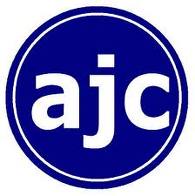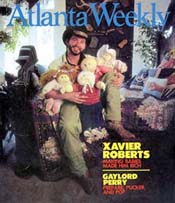Remembering the ever-worsening AJC
 Scott Henry has an excellent article about the Atlanta Journal Constitution’s literal flight to the suburbs in this week’s Creative Loafing. The story argues that the move from Marietta Street to Dunwoody has been occasioned by a literal shift in news content and an almost embarrassingly sycophantic effort to avoid insulting the conservative sentiments of suburban readers. In fact, the editorial page of the AJC has all but disappeared. The AJC is all about following, not leading public opinion.
Scott Henry has an excellent article about the Atlanta Journal Constitution’s literal flight to the suburbs in this week’s Creative Loafing. The story argues that the move from Marietta Street to Dunwoody has been occasioned by a literal shift in news content and an almost embarrassingly sycophantic effort to avoid insulting the conservative sentiments of suburban readers. In fact, the editorial page of the AJC has all but disappeared. The AJC is all about following, not leading public opinion.
The story provoked a good many memories. It doesn’t mention that Creative Loafing itself attempted to penetrate the burbs with highly unprofitable zoned editions for years. So the AJC’s effort to do that isn’t uniquely stupid, not in Atlanta or elsewhere.
Similarly, the story doesn’t mention the failed effort to publish a conservative daily here in the ‘60s, the Atlanta Times. That paper also courted suburban readership. The point is that this strategy has already been proven not to work – even well before the New York Times attempted it here with the Gwinnett Daily News. It’s a great mystery that publishers don’t stop and ask themselves why this strategy is such a predictable loser. I won’t bother to state the obvious explanation.
I’d also argue that the newspaper’s editorial content began its all-out plummet in 1988 when Ron Martin, editor of USA Today, took the editor’s job and introduced the city to highly truncated, excessively illustrated news reporting. I remember a reporter there joking to me that writing a story longer than 8 inches had become exhausting.
For the two years previous to that, the paper was run by Bill Kovach, formerly of the New York Times. Kovach hired a crew of brilliant editors and writers like Dudley Clendinen. They were unpopular with people like redneck columnist Lewis Grizzard, who engaged in a very public battle with Kovach. Grizzard and friends won and Kovach and his crew left.
 Even earlier in the ‘80s, my main editorial job was as a contract writer for the AJC’s Sunday magazine, “Atlanta Weekly.” (I was hired full-time, but left after two weeks, preferring the freelancer’s status.) The management at the paper had hired a crew of smart people from Texas Monthly in Austin, including editor Nancy Smith. This was the most entertaining gig of my work as a journalist. I got to write long stories about esoteric subjects. Several of those ended up in textbooks and I still get reprint requests now and then.
Even earlier in the ‘80s, my main editorial job was as a contract writer for the AJC’s Sunday magazine, “Atlanta Weekly.” (I was hired full-time, but left after two weeks, preferring the freelancer’s status.) The management at the paper had hired a crew of smart people from Texas Monthly in Austin, including editor Nancy Smith. This was the most entertaining gig of my work as a journalist. I got to write long stories about esoteric subjects. Several of those ended up in textbooks and I still get reprint requests now and then.
But Smith’s edgy style was too much for the AJC’s conservative management. She and the rest of the Texas Monthly people fled like the Kovach crew. I followed Nancy to Houston for a few years. Atlanta Weekly, like most newspaper magazines, was killed altogether by the time I returned to Atlanta.
The point is that the paper has a long history of waxing and waning quality. It has rarely tolerated journalism of depth and, while it’s always proudly dropping the name of Ralph McGill, it was not a very good paper even in the years when he was editor. McGill had enlightened attitudes on civil rights, but the paper was still mediocre.
Still earlier, while I was a college student, I worked a year at the Associated Press as a copy boy, an occupation rendered nonexistent by the death of the typewriter and teletype. The AP was located on the top floor of the AJC’s dingey building around the corner from the Marietta Street one that the paper has vacated and donated to the City of Atlanta. (Talk about a reversal of the usual going-away gift-giving.) The paper had published an interview with me (along with a gigantic picture) a few years earlier when I was a high school student, so this helped me get the job upstairs.
Over the years, I alternated work in mainstream media (including lots of other publications besides the AJC) with work in alternative media, like the Atlanta Gazette and Creative Loafing, both of which I edited. As much as I’d like to say otherwise, neither of these publications pursued paths much different from the AJC’s.
The Gazette was owned by Larry Flynt, and he was literally shot in Lawrenceville on the day I went to work for the paper. The Gazette published a lot of biting humor and opinion, plus some investigative reporting. (I wrote a media column as well as edited the weekly.) Some of the city’s best writers had gigs with it. But as time passed and Flynt’s subsidy decreased, the paper sought to increase readership and revenues by undertaking a lot of celebrity reporting. You could hardly call this “alternative journalism,” unless you think People Magazine is alternative.
Things were much the same during my two stints as editor of Creative Loafing. An example: During my first stint in the early ‘80s, when the paper ballooned in size during the holidays, we were instructed to fill the extra space with canned stories about holiday traditions in other cultures. No, I’m not kidding.
When I returned for a five-year stint a few years later, the editorial budget was increased enough that we could do some serious reporting, but it never took priority over the Happenings section and the TV listings. My successor, CB Hackworth, managed to do more serious reporting but things didn’t really change in this respect until Ken Edelstein became editor and he was in a constant battle with the ownership to do that. Mara Shaloup, the current editor, is doing her best too.
I also freelanced for a few other local publications during the ’80s and ’90s. I wrote several controversial stories for monthly publications that took a couple months to research and both were shelved by suddenly nervous editors. The same thing happened at the AJC twice and once at Texas Monthly. I always got paid my full fee (rather than the punitive “kill fee”), but it taught me early on that journalism is a game.
The point here is that so-called alternative journalism in Atlanta has only rarely done things differently from mainstream publications. Just as Creative Loafing’s editorial board cries out for a real daily paper in the city, I think it’s fair to similarly cry out for more alternative journalism of depth.
In summary, the history of journalism in Atlanta is pretty much the same, whichever publication you choose to examine and no matter its financial resources.
There are 4 Comments to "Remembering the ever-worsening AJC"
As the final editor of the Gwinnett and Topside loaves before they were rightfully shit-canned, I can confirm that CL had no business trying to cover the northern suburbs. Like the AJC, we only went there for the ad dollars. If I’d had twice the space, I could’ve mentioned that misadventure — so thanks for bringing up painful repressed memories!
Thanks for the memories, Cliff. I remember the panic it caused in AJC management when you were doing that cover story on drag queens.
I’m still missing your other column in the Loaf, but I’m glad you’re posting now and then, but not nearly enough, on this blog.
The only really alternative paper ever published here was the Great Speckled Bird. And then there was Southline (I think that ws its name), which had good bit more real news than Creative Loafing, but still wasn’t very hard hitting.
Love your Grazing column but ditto what Murphy said about your other one. Wish you would resume it.
Great post. The AJC’s proud history (mostly that of the AC) was mostly undermined by its sychophantic devotion to the chamber of commerce. Atlanta’s downtown and much of its dysfunctional infrastructure owes much to that kind of boosterism. When I moved to ATL in ’98, the AJC was in one of its brief periods of trying to be a serious paper, but then it was quickly back to being a boosterish mid-market paper on steroids. Regional papers seem prone to tbig ups and downs even with a core of good reporters–my hometown Cleveland Plain Dealer has waxed and waned, but on the whole held up better than the AJC despite the economic decline of its principal market.
CL was a major disappointment, too–I’d never seen such an ineffectual “alternative” paper and although it did improve overtime, I knew that once the ill-conceived buy-out of the Reader in Chicago and the City Paper in DC happened that all 3 would go down the tubes. City Paper and The Reader were much stronger journalistic organs and both tried to keep as much real content as possible as long as they could. Both are sad to read now, and because they each maintain a lot of ad pages, it’s clear that both would have survived well in the absence of the buyout.